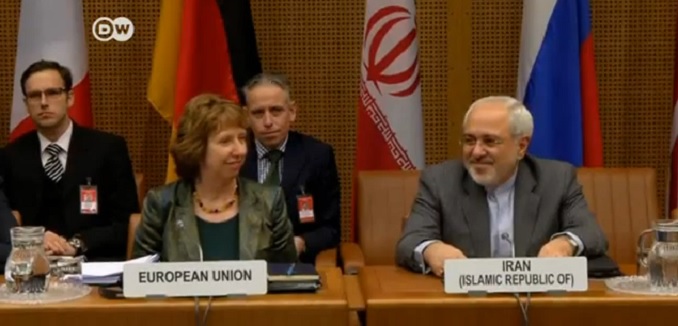The first day of coverage regarding comprehensive talks between Iran and the P5+1 global powers revolved around pessimism from all sides regarding the prospect that talks would succeed, amid declarations by Iranian Supreme Leader Ayatollah Ali Khamenei that negotiations would “not lead anywhere” and statements by U.S. officials that the initial six-month negotiation period – during which Iran is thought to enjoy immunity from additional moves against its nuclear program – would extend at least a year.
On the eve of a fresh round of negotiations in Vienna aimed at reaching a comprehensive nuclear deal, Khamenei, who has the final say in all state matters, reiterated that he was not opposed to the resumption of talks between Iranian and western diplomats but predicted that they would not succeed. “What our foreign ministry and officials have started will continue and Iran will not violate its commitments … but this will not lead anywhere,” he said in a speech in Tehran on Monday.
“Some of the officials of the previous government as well as the officials of this government think the problem will be resolved if they negotiate the nuclear issue,” he told a group of Iranians from the north-western city of Tabriz. “I have said before … I am not optimistic about the negotiations. It will not lead anywhere, but I am not opposed either.”
The concession by Obama administration officials drew criticism from skeptics who have repeatedly pressed the White House on the asymmetric structure of the interim Joint Plan of Action, which provides irreversible concessions to Iran in the form of cash injections while leaving open the possibility that Tehran will pocket the concessions and walk away from further talks. Khamenei’s speech, meanwhile, is likely to deepen concerns – long voiced by analysts – that expressions of distrust by the Iranian ruler have precisely been leveraged as pretexts to abandon negotiations. For their part, Reuters described his statements as “his strongest sign of support for moderate President Hassan Rouhani’s push to resolve the conflict peacefully,” in a story headlined “Iran’s Khamenei backs nuclear talks but not optimistic.” The developments are already fueling increasingly emphatic calls for Congressional input into the administration’s diplomacy. Senator Mark Kirk (R-IL) was quoted by USA Today demanding that any negotiation process preclude Khamenei’s ability “to wake up one day, kick out inspectors and race to the bomb.”
“At the end of this process, will Iran’s supreme leader be able to wake up one day, kick out inspectors and race to the bomb? ‘No’ should be the only acceptable answer to that question,” said Sen. Mark Kirk, R-Ill. Kirk says any pact must have a clear goal of ending the nuclear program and halt all nuclear enrichment. President Obama is trying to prevent the bill from coming to a vote, saying it would anger the Iranians into walking away from negotiations.
[Photo: DW (English) / YouTube]




